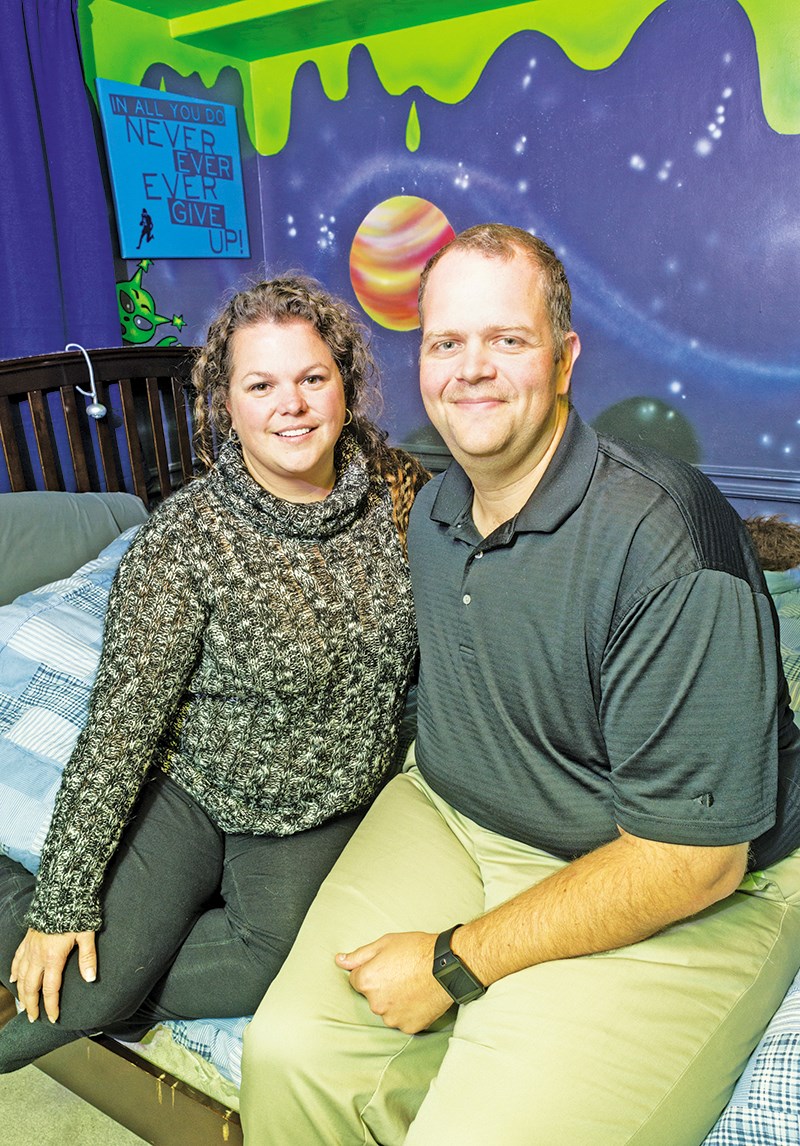Tara Jeffrey
In the beginning, Julie and Marcel Blais thought that parenthood would just happen naturally.
“You think you’re going to get married, have kids, get the white picket fence, etc.,” said Julie Blais. “You don’t ever think it’s going to be years of struggle.”
She’s talking about the roller coaster journey the Sarnia couple endured while trying to have children.
Married in their mid-20s, the Blais’ tried for a year to conceive before a referral by their family physician to a fertility clinic in London, where a diagnosis of polycystic ovaries was given for her, and a low sperm count for him.
Thus began three agonizing years of medications, injections, and countless appointments. Julie often drove to London several times a week for blood work and ultrasounds.
“It’s an absolutely exhausting experience,” she said, noting both the emotional and financial toll. “It’s almost like the movie Groundhog Day. You go down (to London), go through the same thing over and over again, and hear the same thing: It’s a no. It’s a no. It’s a no.”
With dashed hopes, and one final shot at Intrauterine Insemination (IUI), they were finally able to get pregnant.
“We were over-the-moon thrilled,” said Blais, who gave birth to a healthy baby boy.
Knowing the odds were against them, the couple returned immediately to London when they were ready to try for their second.
This time, four exhausting years went by before the good news finally came -- they were able to get pregnant again.
But an unexpected miscarriage left them devastated.
“I wasn’t prepared for it at all -- we were just so excited, that it had never even occurred to me that I could have lost this,” said Blais.
“It was brutal,” her husband added, noting a lack of local supports for couples dealing with infertility and pregnancy loss. “We wouldn’t have gotten through it without family and friends, but there’s really not a whole lot of help in the community at all.”
With heavy hearts, the Blais’ decided to try one last time.
“We were bound and bent. We weren’t going to give up,” said Blais, who, one year later, gave birth to a healthy baby girl.
Their children are now five and 10 -- and they’ve since become foster parents to three more -- but the Blais’ say the experience still haunts them.
“It’s a long, exhausting, emotional roller coaster. And until you’re in those shoes, you really have no idea,” said Julie Blais. “It would have been nice to go to a group in Sarnia -- just to know what to expect and share my struggles.”
About one in six Canadian couples experience infertility -- a number that has doubled since the 1980s.
“There’s still a bit of stigma out there,” said Jocelyn Smith, president of the Infertility Awareness Association of Canada (IAAC). “But for the most part, I think people don’t talk about it because it’s just so upsetting.”
Infertility refers to a lack of conception after one year (or six months for women over 35),
Fertility services are not provided in Sarnia-Lambton. Couples are typically referred, by a local physician, to London for any further treatment.
Local health officials say there are no known support groups in Sarnia-Lambton for couples dealing with infertility.
A Ministry of Children and Youth website notes that only 37% of people surveyed reported receiving counselling. It adds that cost is the single greatest barrier to building a family through assisted reproduction.
“Support groups are so, so valuable,” said Smith, adding that couples who experience pregnancy loss are equally in need. “That’s a huge deal and a horrible thing to go through, and it’s just so misunderstood in the public,” she said. “Women who miscarry once, twice, three times... they’re left devastated.”
There are counselling and support services in Windsor and London, but none in Sarnia that Smith is aware of.
“There should be one in every city -- every town,” she said. “People have to travel, take time off work, deal with all the expenses, and then grieve by themselves? It’s horrible.”
The Blais’ say they were lucky to have the support of their employers during their ordeal -- she worked for Sarnia-Lambton Rebound at the time, and he is a registered nurse.
And his background in medicine helped a lot, Blais said.
But they know not everyone is as fortunate.
“For as big a community this is, it’s disheartening that we have to leave in order to get these services,” he said. “There’s really no where to turn in Sarnia.”
